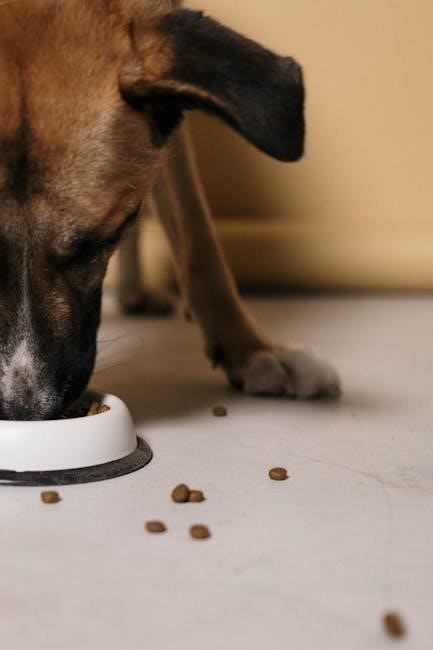
ava puppy food feeding guide
Welcome to the Ava Puppy Food Feeding Guide, your comprehensive resource for raising a healthy puppy. This guide provides expert advice on proper nutrition, feeding schedules, and essential tips to ensure your puppy thrives. Whether you’re a new puppy owner or a seasoned caregiver, this guide offers tailored insights to meet your pup’s unique needs.
1.1 Overview of Puppy Feeding Basics
Feeding your puppy properly is crucial for healthy growth and development. Start with high-quality puppy food rich in protein and essential nutrients. Portion sizes should align with your puppy’s weight, breed, and age. Avoid overfeeding to prevent obesity and ensure a balanced diet. Introduce solid food gradually, soaking kibble if needed. Avoid human foods and focus on nutrient-rich, complete puppy meals. Consult your vet for personalized feeding plans to support your puppy’s specific needs and ensure optimal health.
1.2 Importance of Proper Nutrition for Puppies
Proper nutrition is vital for puppies’ growth, energy, and long-term health. A balanced diet ensures they receive essential proteins, fats, vitamins, and minerals. Without adequate nutrients, puppies may face developmental issues or health problems. High-quality puppy food supports strong immune systems, healthy coats, and optimal energy levels. Avoiding human food and focusing on nutrient-rich puppy meals helps prevent deficiencies and promotes overall well-being. Proper nutrition sets the foundation for a thriving, happy puppy;
Factors Determining Feeding Amounts
- Puppy weight and growth stage significantly influence feeding amounts.
- Breed and size affect metabolic rates and energy needs.
- Activity levels and lifestyle impact calorie requirements.
2.1 Puppy Weight and Growth Stage
Puppy weight and growth stage are critical factors in determining feeding amounts. Puppies grow rapidly, requiring more nutrients during growth spurts. For example, a 4kg puppy expected to reach 15kg as an adult needs about 100-150 grams of food per kilogram of body weight daily. Feeding amounts should increase gradually as weight and age progress, ensuring proper development without overfeeding.
2.2 Breed and Size Considerations
Breed and size significantly influence feeding amounts, as larger breeds like Labradors require more food than smaller breeds like Pugs. For example, a Basset Hound x Beagle puppy weighing 4kg and expected to reach 15kg needs tailored portions to support growth. Larger breeds may need controlled feeding to prevent rapid growth, while smaller breeds require more frequent, smaller meals to match their higher metabolism and energy levels.
2.4 Activity Level and Energy Needs
A puppy’s activity level significantly impacts feeding amounts. Active puppies or high-energy breeds require more calories to sustain their energy needs. Conversely, less active puppies may need fewer calories to prevent weight gain. Factors like exercise frequency and playtime should guide portion adjustments. Ensuring a balanced diet that meets energy demands without overfeeding is crucial for healthy growth and development.
Types of Puppy Food
This section explores various puppy food options, including dry, wet, raw, and homemade diets, discussing their pros, cons, and suitability for different puppies’ needs.
3.1 Dry vs. Wet Food: Pros and Cons
Dry food is cost-effective, convenient, and promotes dental health by reducing tartar. Wet food provides higher moisture content, which supports hydration and may be more palatable. Consider your puppy’s preferences, budget, and health needs when choosing between them. Both options can be nutritionally balanced if they meet AAFCO standards, ensuring your puppy receives essential nutrients for optimal growth and development.
3.2 Raw Diets: Safety and Recommendations
Raw diets for puppies are controversial due to risks of bacterial contamination and nutritional imbalances. The AVMA discourages raw feeding unless properly processed to eliminate pathogens. If considering raw diets, consult a veterinarian to ensure safety and nutritional adequacy. Proper handling and storage are crucial to prevent health risks. While some owners swear by raw diets for better digestion and health, careful planning is essential to avoid deficiencies and ensure a balanced diet for your puppy.
3.3 Homemade Diets: Benefits and Risks
Homemade diets offer customization to meet a puppy’s specific needs, allowing owners to avoid allergens and ensure high-quality ingredients. They can be more digestible for sensitive puppies and provide fresh, whole foods. However, homemade diets risk nutritional imbalances without proper planning. They require significant time and effort to prepare and may be costly. Consulting a vet or canine nutritionist is essential to ensure a balanced and complete diet for optimal health.

Nutritional Requirements
Puppies need a balanced diet rich in essential macronutrients like protein, fat, and carbohydrates, along with vital vitamins and minerals to support growth and development. Ensuring meals meet established nutritional guidelines guarantees optimal health and energy levels, while adhering to AAFCO standards helps confirm the food’s quality and safety for your puppy.
4.1 Essential Macronutrients: Protein, Fat, Carbohydrates
Protein is crucial for puppy growth, supporting muscle development and tissue repair. High-quality sources like chicken or fish ensure amino acids are present. Fat provides energy and aids in nutrient absorption, with balanced levels essential for skin and coat health. Carbohydrates, such as whole grains, offer sustained energy and fiber for digestion. Together, these macronutrients create a balanced diet that supports overall health and development in puppies.
4.2 Micronutrients: Vitamins and Minerals
Vitamins and minerals are vital for a puppy’s growth and development. Vitamin D supports bone health, while calcium and phosphorus promote strong teeth and skeletal structure. Trace minerals like zinc and iron are essential for immune function and energy production. These micronutrients ensure proper physiological processes, making them a critical component of a balanced puppy diet for optimal health and vitality.
4.3 Importance of AAFCO Guidelines
AAFCO guidelines ensure puppy food meets essential nutritional standards for growth and development. They define minimum requirements for protein, fat, vitamins, and minerals, guaranteeing a balanced diet. Compliance with AAFCO standards helps pet owners choose high-quality food, ensuring their puppy receives adequate nutrition for optimal health and vitality throughout their life stages.

Feeding Schedule and Portion Control
A well-structured feeding schedule ensures your puppy receives consistent nutrition. Measure portions accurately and adjust based on age, size, and breed to promote healthy growth and prevent overfeeding.
5.1 Feeding Frequency by Age
Puppies require frequent meals tailored to their age. Newborns need feeding every 3-4 hours, while 8-12 week olds thrive on 3-4 meals daily. By 3-6 months, 2-3 meals are sufficient, and from 6 months onward, most puppies transition to twice daily feeding. Adjusting frequency as your puppy grows ensures proper digestion and energy levels, supporting overall development and preventing overfeeding or underfeeding.
5.2 Determining Portion Sizes
Portion sizes for puppies vary based on weight, breed, and growth stage. Check the food label for feeding guidelines specific to your puppy’s size and age.Consult your veterinarian to ensure portions align with your puppy’s energy needs and prevent overfeeding or underfeeding. Monitoring your puppy’s weight and body condition helps adjust portions accurately, supporting healthy growth and development without risking obesity or nutritional deficiencies.
5.3 Avoiding Overfeeding and Underfeeding
Avoiding overfeeding and underfeeding is crucial for your puppy’s health. Overfeeding can lead to obesity and related issues, while underfeeding may cause stunted growth. Monitor portion sizes, adjusting based on weight and activity. Ensure meals are balanced and meet nutritional needs. Track growth milestones and consult your vet regularly to maintain a healthy weight and body condition, ensuring your puppy thrives without risks of malnutrition or excess weight gain.

Feeding Methods and Tips
This section explores effective feeding methods and practical tips for your puppy. Learn about soaking food, transitioning to solids, and encouraging healthy eating habits for optimal growth.
6.1 When to Soak Puppy Food
Soaking puppy food is recommended for puppies aged 3-4 weeks up to 12 weeks. This helps soften kibble, making it easier to chew and digest, especially for teething pups. Soaking can also prevent choking hazards and support transitioning from milk to solid food. Generally, soaking is advised until the puppy is comfortable eating dry food, typically by 12 weeks of age.
6.2 Transitioning to Solid Food
Transitioning to solid food should begin around 12 weeks of age, following the soaking period. Start by mixing soaked kibble with a small amount of dry food, gradually increasing the proportion of solids. Ensure the food is still soft enough for comfortable chewing. Monitor your puppy’s digestion and appetite, adjusting the transition pace as needed to prevent digestive upset. This gradual process supports a smooth shift to solid meals.
6.3 Encouraging Healthy Eating Habits
Establishing healthy eating habits begins with consistency. Feed your puppy in a quiet, distraction-free area to promote focus on meals. Avoid overfeeding by monitoring portion sizes and preventing treats from exceeding 10% of their daily calorie intake. Offer high-quality, nutrient-rich food that aligns with their life stage and breed needs. Encourage gradual eating by using puzzle feeders or spreading meals, reducing the risk of gobbling food. Maintain a regular feeding schedule to support digestion and overall well-being.
Safety Considerations
Ensure your puppy’s food is stored properly to prevent contamination. Avoid harmful human foods and toxins. Always follow safe handling practices to minimize the risk of foodborne illnesses.
7.1 Foods to Avoid Feeding Puppies
Avoid feeding puppies chocolate, onions, garlic, grapes, and raisins, as these can be toxic. Raw or undercooked meat, eggs, and fish may contain harmful bacteria like Salmonella. Xylitol, found in sugar-free products, is also dangerous. Additionally, avoid giving puppies human snacks high in salt or sugar, as they can lead to health issues. Always stick to puppy-formulated foods and consult your vet for personalized dietary advice.
7.2 Preventing Foodborne Illnesses
Preventing foodborne illnesses in puppies requires proper handling and storage of their food. Always store puppy food in airtight containers and use clean utensils when serving. Avoid cross-contamination by keeping raw meat and puppy food separate. Serve food at room temperature to reduce bacterial growth. Choosing a high-quality, nutrient-rich puppy food can also minimize contamination risks. Always consult your veterinarian for advice on safe feeding practices.
7.3 Recognizing Food Allergies
Recognizing food allergies in puppies is crucial for their health. Common signs include itching, skin rashes, digestive issues, and ear infections. If you suspect an allergy, consult your vet for an elimination diet. Identify triggers like beef, dairy, or soy. Gradually introduce new foods to monitor reactions. Always prioritize high-quality, hypoallergenic puppy food to ensure your pup’s well-being and prevent long-term health complications.

Monitoring Puppy Health
Regularly monitor your puppy’s weight, digestion, energy levels, and skin condition. Consult your veterinarian if you notice unusual changes, ensuring optimal health and addressing issues early.
8.1 Signs of Healthy Growth
A healthy puppy exhibits steady weight gain, shiny coat, vibrant eyes, and high energy levels. Proper digestion is evident through regular, well-formed stools. Monitoring these signs ensures your puppy is thriving. Consult your veterinarian to confirm growth is on track and address any concerns promptly for optimal development.
8.2 Adjusting Diet Based on Health Issues
If your puppy experiences health issues, such as allergies or digestive problems, their diet may need adjustment. Switching to hypoallergenic or easily digestible foods can alleviate symptoms. Always consult your veterinarian for personalized recommendations tailored to your puppy’s specific needs. Monitoring their response and making gradual changes ensures their well-being and supports recovery without causing further complications.
8.3 Consulting with Veterinarians
Consulting with veterinarians ensures personalized feeding recommendations tailored to your puppy’s breed, size, and health status. They can identify nutritional deficiencies and suggest diet adjustments. Regular check-ups help monitor growth and address potential issues early. Veterinarians provide expert guidance on portion control and food quality, ensuring your puppy receives optimal nutrition for healthy development. Their advice is invaluable for preventing issues like obesity or food allergies, promoting long-term well-being.
Budget-Friendly Feeding Options
Explore cost-effective feeding strategies and affordable dog food brands that provide balanced nutrition without compromising quality. Plan meals wisely to save money while ensuring your puppy thrives.
9.1 Affordable Dog Food Brands
Several brands offer high-quality, budget-friendly puppy food. Purina, Royal Canin, and Hill’s Science Diet are popular choices known for their nutritional value and affordability. Additionally, brands like Taste of the Wild and Blue Buffalo provide cost-effective options without compromising on essential nutrients. Always check for AAFCO certification to ensure the food meets your puppy’s dietary needs. Consulting with your veterinarian can also help you choose the best option within your budget.
9.2 Cost-Effective Feeding Strategies
To save money without compromising your puppy’s nutrition, consider buying high-quality food in bulk and using coupons. Portion control is key to avoiding waste. Rotate between affordable, nutrient-rich brands to ensure variety. Consult your veterinarian for personalized feeding plans that fit your budget. Avoid costly treats and opt for healthy, homemade alternatives. Proper meal planning can reduce expenses while maintaining your puppy’s health and well-being.
9.3 Avoiding Cheap, Low-Quality Foods
While budget-friendly options are important, avoid cheap, low-quality foods filled with fillers and by-products. These can lead to digestive issues and nutritional deficiencies in puppies. Always check ingredient lists and look for whole, named ingredients. Avoid foods with artificial preservatives or excessive sodium. Prioritize brands that meet AAFCO standards for puppy nutrition. Consulting your veterinarian can help you choose affordable yet nutritious options, ensuring your puppy’s long-term health and well-being.

Common Feeding Mistakes
Overfeeding, underfeeding, and inconsistent schedules are frequent errors. These mistakes can lead to obesity, malnutrition, or digestive issues. Awareness and adjustment are key to avoiding these pitfalls.
10.1 Overfeeding and Obesity Risks
Overfeeding is a common mistake that can lead to obesity in puppies, increasing the risk of diabetes, joint issues, and heart problems. Monitor food intake carefully, using feeding charts as a guide. Excess weight can hinder growth and longevity. Consult your vet to ensure portions are appropriate for your puppy’s size, breed, and activity level. Signs of overfeeding include rapid weight gain and lethargy. Avoid treats and table scraps to prevent unhealthy habits. Proper portion control supports a balanced, healthy lifestyle for your puppy.
10.2 Underfeeding and Nutritional Deficiencies
Underfeeding can lead to nutritional deficiencies, stunted growth, and weakened immunity in puppies. Ensure meals provide essential macronutrients like protein and fat, as well as vital vitamins and minerals. Signs of underfeeding include lethargy, slow growth, and thin appearance. Always follow portion guidelines and consult a vet if unsure. A balanced diet is crucial for optimal development and preventing long-term health issues in your puppy.
10.3 Inconsistent Feeding Schedules
Inconsistent feeding schedules can disrupt a puppy’s digestion, leading to digestive upset and difficulty in house training. Irregular feeding times may also cause behavioral issues, such as anxiety or overeating. Establishing a structured routine ensures your puppy receives consistent nourishment, promoting healthy growth and preventing potential health problems. Stick to a set schedule and consult your vet for personalized advice to avoid these challenges.
11.1 Summary of Key Feeding Guidelines
Proper nutrition is vital for puppies, ensuring healthy growth and development. Feed high-quality food tailored to their breed, size, and life stage. Monitor weight and adjust portions to prevent overfeeding. Establish a consistent feeding schedule and avoid unhealthy treats; Consult your veterinarian regularly to address specific needs; Always choose food meeting AAFCO guidelines for balanced nutrition. These guidelines help ensure your puppy receives the necessary nutrients for optimal health and longevity.
11.2 Final Tips for Raising a Healthy Puppy
Raising a healthy puppy requires consistency, patience, and attention to detail. Provide a balanced diet, regular exercise, and mental stimulation. Establish a routine for feeding, play, and sleep. Monitor growth and adjust feeding portions as needed. Schedule regular vet check-ups to ensure optimal health. Avoid overfeeding and keep harmful foods out of reach. Create a loving, safe environment, and spend quality time with your puppy to foster a strong bond and lifelong well-being.
Resources and Further Reading
Visit vcahospitals.com and allaboutdogfood.co.uk for expert puppy nutrition advice. Explore Purina’s puppy articles for comprehensive feeding guides and health tips to support your puppy’s growth and well-being.
12.1 Recommended Websites for Puppy Nutrition
For reliable puppy nutrition advice, visit vcahospitals.com and allaboutdogfood.co.uk. These websites offer expert guides, food reviews, and essential tips to ensure your puppy receives balanced nutrition. Purina also provides detailed articles on feeding fundamentals and health. These resources are trusted by veterinarians and pet owners, making them invaluable for raising a healthy, thriving puppy with optimal dietary care.
12.2 Suggested Reading Materials
For in-depth puppy nutrition knowledge, consider reading “The Complete Puppy Care Manual” and “Puppy Nutrition: A Vet’s Guide”. These books offer expert insights into feeding strategies, growth stages, and dietary needs. Additionally, Purina’s Puppy Care Handbook provides practical tips and detailed feeding charts. These resources are perfect for new and experienced puppy owners seeking comprehensive guidance on raising a healthy pup with balanced nutrition.